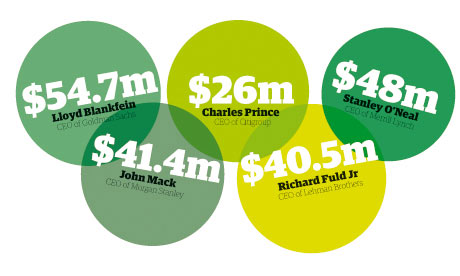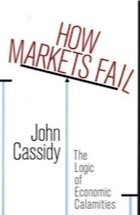Substitute the following:
1. Wall Street bosses with MINISTARS
2. Firms like Citi with termalsick and GeeAiSee..etc
1. Wall Street bosses with MINISTARS
2. Firms like Citi with termalsick and GeeAiSee..etc
What was really behind last year's market crash?
In an exclusive extract from his new book, John Cassidy explains why the huge salaries of Wall Street bosses created a culture that helped trigger the financial crisis
- John Cassidy
- The Guardian, Wednesday 25 November 2009
- Article history

Economics, when you strip away the guff and the mathematical sophistry, is largely about incentives. At any time, these can get distorted in a particular market. Usually, though, the memory of past crashes, together with financial regulations and restrictive social conventions, preserve a modicum of stability.
- How Markets Fail: The Logic of Economic Calamities
- by John Cassidy
- 400pp,
- Allen Lane,
- £25.00
-

But during Alan Greenspan's era in charge of the US Federal Reserve, lax monetary policy, deregulation and financial innovation shocked the economy out of its stable configuration, placing it on a "bubble path". No single one of these factors can be held solely responsible; it was the combination that did the damage.
There was, however, another factor that played an important role: the enormous incentive packages that many traders and senior executives on Wall Street received. Once the credit bubble got started, the men who ran the biggest financial institutions in America were determined to surf it, regardless of the risks involved. Because from where they sat, and given the financial incentives they faced, pursuing any other strategy would have been irrational.
The problem of excessive pay isn't peculiar to Wall Street; its effects just happen to be more pernicious there. When a highly paid rogue CEO such as Enron's Kenneth Lay or WorldCom's Bernie Ebbers creates or condones a culture of deception in a misguided effort to boost their firm's stock price, the consequences for the employees and stock-holders of the company can be severe. And when a Wall Street CEO levers up their firm's equity capital 30 or 40 to one in search of extra profits, their actions can bring down the entire economy.
Yet Wall Street remuneration schemes take no account of this. When the markets are rising and deals are getting done, traders, investment bankers and their bosses are paid magnificently; when things go wrong, the shareholders of the firms and, in extreme circumstances the taxpayers, suffer the bulk of the losses.
The market failure begins on the trading floor, where individuals have an incentive to take excessive risks with the firm's capital. A useful way to think about them is as entrepreneurs who enter profit-sharing agreements to rent out part of their firms' balance sheets. Without access to cheap funding, even the smartest trader is helpless. But with the backing of a mighty Citigroup or Goldman, he can make enormous bonuses.
Some trading desks give their employees up to half of the profits they generate above a certain target. However, the trader's downside is capped. If his trades generate large losses, he might lose his job, but he doesn't have to write the firm a cheque to cover the cost of his mistakes. If his trades turn out badly, the firm has no recourse to his personal assets, or even the bonuses he earned in previous years.
Another way to characterise such arrangements is as a "trader's option", because they give the employee a free option on the upside to his trades. Of course, the top executives of financial firms have the responsibility of managing the risks their institutions take on. Yet in many ways, they face a similar set of incentives to the ones facing traders.If things go well, the firm's shares go up, and so does the value of the bosses' stock options. If things go badly, they have extremely generous "retirement" packages to fall back on. In fact, the "CEO's option" turns out to be an even bigger problem than the trader's option. Even the most gung-ho trading desks face some trading limits; Wall Street CEOs can, and have, put entire firms on the line.
The rise of stock options
The development of elephantine compensation packages for Wall Street CEOs followed the pattern of other industries. During the 1960s and 70s, many commentators and investors expressed concern that CEOs were more interested in building up personal fiefdoms, complete with lavish headquarters, plush corporate resorts and private jets, than in acting in the interests of shareholders. In an extremely influential paper published in 1976, Michael Jensen, now of Harvard, and the late William Meckling depicted the relationship of CEOs and stockholders as a "principal-agent" problem.
As anybody who has hired a contractor knows, it can be difficult to monitor their behaviour: the contractor may say he is working diligently, but is he telling the truth? With public companies, the shareholders are the principals and the CEO is their agent. Since corporations are big and complicated, it is hard to tell from the outside whether a CEO is doing a good job.
One way to align the interests of stockholders and the CEO is to remunerate the latter with large numbers of shares, or stock options. If that were done, Jensen and others argued, CEOs would come to view themselves as owners instead of hired employees, and the result would be much better management.
"On average, corporate America pays its most important leaders like bureaucrats," Jensen and Kevin Murphy, an economist now at the University of Southern California, argued in a 1990 article. "Is it any wonder that so many CEOs act like bureaucrats, rather than the value-maximising entrepreneurs companies need to enhance their standing in world markets?"
Corporate America sat up and listened. As recently as 1980, fewer than one in three chief executives had been granted stock options; by 1994, the proportion had risen to seven in 10. In the ensuing years, enormous options grants became the norm, enabling prominent CEOs such as Jack Welch, of General Electric, and Michael Eisner, of Disney, to build up fortunes worth hundreds of millions of dollars .
The Jensen doctrine quickly spread to Wall Street, where executives such as Sanford "Sandy" Weill of Citigroup, and Maurice "Hank" Greenberg of AIG, accumulated dynastic wealth. Some free-market economists credited the changes in remuneration structure with reinvigorating corporate America. But even Jensen eventually conceded that it also created serious problems – many of which came to light during the great accounting scandals of 2001–02.
"I was a defender of the move toward stock options and more liberal rewards for CEOs," Jensen told me in 2002. "But I'm now a critic of where we got to."
It was no coincidence that the accounting scandals emerged after the bursting of the technology stock bubble. Many firms' stock prices had become wildly overvalued, and their managers, pockets bulging with stock options, were struggling to create profits that would justify them. "For a long time now, we've had a situation in which the stock prices of many firms had been too high," Jensen went on. "That is to managers what heroin is to a drug addict."
Why CEOs liked risky bets
On Wall Street, many decisions, such as whether to enter a certain business or underwrite a certain deal, can be thought of as risky gambles. In certain states of the world, they will pay off; in others, they won't. It is a fundamental principle of corporate finance that firms should carry out projects that are expected to generate economic profits, and forgo projects that are expected to result in a loss.
...to be contd....

